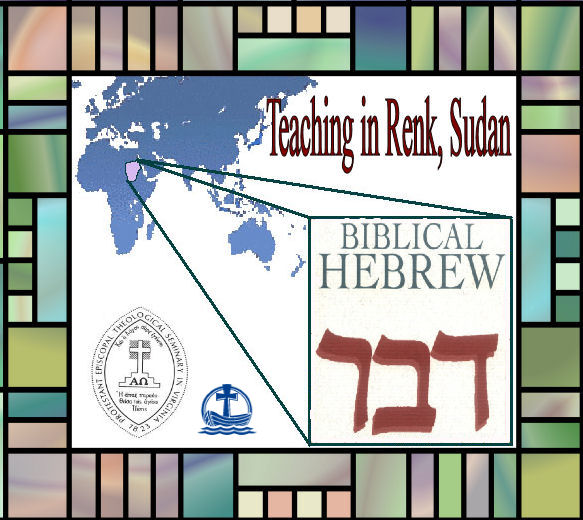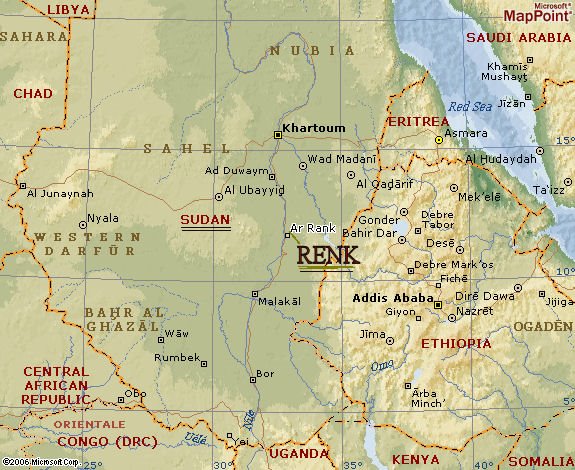Welcome, one and all,
Step Right Up to Biblical Studies Blog Carnival 19. Thank you for the honor of hosting this month's carnival here at Biblische Ausbildung. There are plenty of attractions here, so let's hurry in...

Let's start with something fun: Is it a coincidence that the name "Shakespeare" seams to appear in Psalm 46 in the 1611 Authorized Version? Click
here for a consideration!
A major contribution of biblical blogging came this month in the form of John Hobbins's series of posts on "Thinking about Canon." The series got a lot of bloggers thinking about canonical issues, which in my opinion is far from a bad thing! Here is a list of John's posts on the topic; in his "update" posts, he acknowledges and links to all those who responded to his posts and kept the conversation going:
Part 1;
First Update;
Second Update;
Part 2;
Third Update;
Part 3;
Fourth Update;
Part 4;
Fifth Update;
Part 5;
Appendix A;
Sixth Update;
Appendix B;
Appendix C;
Seventh Update. Among the several bloggers who interacted with John was
Duane Smith. On a related note, Chris Weimer has posted the seventh installment of his series on ancient canonical lists (NT canon) (click
here).
Speaking of "canon," June proved to be the saddest of months in that it saw the death at age 83 of biblical-studies giant Brevard S. Childs, 1923-2007. The news broke here on Biblische Ausbildung (click
here;
here;
here; and
here), but soon spread throughout the Blogosphere. My friend Christopher Seitz has written the SBL obituary (click
here). Daniel Driver's WebSpace is the best place to start reflecting on Childs' significance (click
here and
here and
here). My friend Kevin Wilson has a nice remembrance
here. Among many other web-tributes to Childs, here a few to try: click
here, and
here, and
here, and
here. Also of interest is Jim West's lament of the lack of public attention to such a huge loss as this:
here.
Another deeply felt death this month was that of Michael Patrick O'Connor, 1950-2007 (click
here). Michael's death at only 57 leaves many of us heartsick. Jo Ann Hackett and John Huehnergard of Harvard University have written an obituary for the SBL site (click
here). For other tributes and remembrances, click
here; and
here, and
here, and
here.
In June we also learned of the deaths of Jim Ross (click
here and
here) and Robert North (click
here and
here).
Let's move to Hebrew Bible and cognate studies:
We've just mentioned Michael O'Connor, and there were some interesting posts on historical and epigraphical Hebrew study this month. For example, check out Charles Halton's post on Steven Kaufman's thoughts on the Paragogic Nun (click
here). The post prompted Duane Smith to make a detailed post of his own on Kaufman's view, in which he raises several serious questions about it (click
here).
The following Hebrew Bible/OT posts don't really "clump" together well, they are so varied, but each has its own unique interest: A new biblioblogger, Iyov, has a neat post on Ezekiel 8:17 and tikkun soferim (click
here). For a lively discussion of what "Selah" might possible mean and do in psalms, check out this
post and comments. Chris Weimer has a cool post on "Old Church Slavonic and Biblical Studies" (click
here). And Alli Diller offers an appreciative look at
"The Wife of Noble Character" of Proverbs 31.
Let's move on to the context of the ancient Near East. This month, Chris Heard had an interesting post entitled, "Is the Old Testament an ancient Near Eastern text?" (click
here). It appears that this one was somewhat overlooked, and deserves more comments and discussion, so click on over and put in your two cents! The more die-hard epigraphers among us will not want to miss Duane Smith's post on the Taanach letters from the 15th century B.C.E. (click
here).
Chris Heard in his blog,
Higgaion, posted in June a serial review of Terje Oestigaard's
Political Archaeology and Holy Nationalism. The review ran for nine posts:
Chapter 1;
Chapter 2a;
Chapter 2b;
Chapter 2c;
Chapter 3a;
Chapter 3b;
Chapter 3c;
Chapter 4a;
Chapter 4b. Interestingly in this connection, there was a concurrent colloquium with Terje on Jim West's Biblical Studies Yahoo! Group in June. Jim, can you post a digest for us? [
Update: Jim has done it!: click
here]
Speaking of matters archaeological, the fierce debate over Israel Finkelstein's proposed "Low Chronology" rages on... (click
here and
here).
Also of "archaeological" interest is a post by Jim West with a few images of unpublished Dead Sea Scroll fragments available nowhere else (click
here). The fragments are tiny but intriguing. Controversially to say the least, such fragments are available for sale on the antiquities market. Speaking of the scrolls, James Davila offers some defenses of the much maligned original team of Dead Sea Scroll editors in:
this post. Also of note: apparently the
Qumran Visualization Project will be up and running in San Diego when the SBL is there this fall (HT: Airton José da Silva).
Now, on to New Testament and early Christianity:
In June, Michael Barber posted on the
Davidic imagery used in the Passion Narrative: click
here. Brant Pitre followed up on that post with a treatment of "The Footsteps of the Messiah and the Messianic Tribulation" (click
here). He argues that Jesus saw himself undergoing a messianic tribulation that he saw portrayed in Psalm 89.
Brant also had a post on the way Jesus sets out to fulfill Jewish hopes for the "The Lost Tribes of Israel, the Promised Land and the New Creation": click
here. Michael also discussed the Feeding of the Five Thousand: click
here.
Gary Greenberg has posted on-line the first chapter of his just released book,
The Judas Brief: Who Really Killed Jesus?, which can be read
here (a PDF download). Richard Anderson has some fulsome discussion of views on circumcision in earliest Christianity
here. Interested in locating "Satan's Throne" (Rev 2:13)? Check out
this post (with images).
Michael Bird had a brief, but thought-provoking post on Petrine and Pauline perspectives in Mark. At last count, there were 15 comments: click
here.
Chris Tilling conducted a three part interview with Chris VanLandingham, the author of the controversial new book on Paul,
Judgment and Justification in Early Judaism and the Apostle Paul (Hendrickson Publishers, 2006):
Part 1,
Part 2, and
Part 3.
Moving more toward the realm of biblical theology, Michael Pahl has a series on "What is the Gospel?" (click
here).
If your interests tend more towards history and the wider NT milieu, Jim West calls our attention to ongoing interest in apparent anomalies in the Masada story in:
this post. On Masada and the new controversy over the skeletal remains found there, see James Davila's
post.
On a more philosophical level, there was some interesting blogging in June on the topic of the "inerrancy" of Scripture. Jeremy Pierce has a post comparing and contrasting the concepts of "inerrancy" and "infallibility" in characterizing the Scriptures (click
here). And from a different perspective, Chris Tilling has two posts on inerrancy, the first with a cartoon, the second with an actual proposed new statement on inerrancy for our consideration (the latter is very thoughtful, in my view): click
here and
here.
There were some interesting posts this month on extra-canonical gospels:
There was fascinating interchange this month between Mark Goodacre and Nicholas Perrin over Perrin's book,
Thomas, the Other Gospel. A good place to start is
here. For P. J. Williams' response to Perrin, click
here. For his part, Gary Greenberg in a post entitled "The Gospel of Judas as an enhancement to the Gospel of Mark" examined evidence that the author of the Gospel of Judas utilized the Gospel of Mark as a framework for his own version of the betrayal: click
here.
This month, there was also continuing interest in reconstructing earliest Christian history. Announcement came that 81-year-old Martin Hengel and Anna M. Schwemer have started to publish a new 4-volume history of earliest Christianity (click
here and
here). G. Greenberg's post "What Son of Jesus?" this month looked at what Eusebius has to say about the family of Jesus: click
here. From this look, he discerns "an overwhelming circumstantial case that Jesus had no son." (This is certainly a timely post in the wake of "The da Vinci Code" novel and movie and more recent controversy about a "Jesus family tomb" including a reference to the son of Jesus.) Speaking of James Tabor's "Jesus Dynasty" controversy, check out the searing critique this month by Michael Bird, with a few responses (click
here), and
this post linking to the Jonathan Reed review of
The Jesus Family Tomb.
Now, for some computing and technology posts: Let's start with a poll: which software do you use for working with the original biblical languages---Logos, Bibleworks, Accordance, something else? Cast your vote
here. On another topic, Tim Bulkeley at SansBlogue has two really useful posts on using Unicode. A lot of us are still playing catch-up here (BibleWorks, included), but it is getting easier to type in Hebrew, Greek, and Transliteration in WindowsXP in such a way that most others can actually read your fonts---The key is Unicode. For Tim's tutorials on getting started typing in it, click
here and
here.
Now that you've got the proper fonts, how about actually doing some writing. Need some support and feedback? Check out Angela R. Erisman's post about forming a "Writing Group" with some colleagues (click
here).
We're almost at the end. I should note upcoming hosts of the Biblical Studies Carnival: Carnival XX will be hosted by Claude Mariottini,
Dr. Claude Mariottini - Professor of Old Testament - August 2007); Carnival XXI will be hosted by Duane Smith,
Abnormal Interests - September 2007; and Carnival XXII will be hosted by Tim Bulkeley,
Sansblogue - October 2007. Interested in hosting a future Biblical Studies Carnival on your own blog? Just click
here to learn more!
Well, that is all I have time to list for Carnival 19, covering June 2007. Deep apologies to folks whose interesting posts got inadvertently omitted. Also, hearty thanks to everyone who made a nomination. Your help is most appreciated! Cheers! ---SLC














